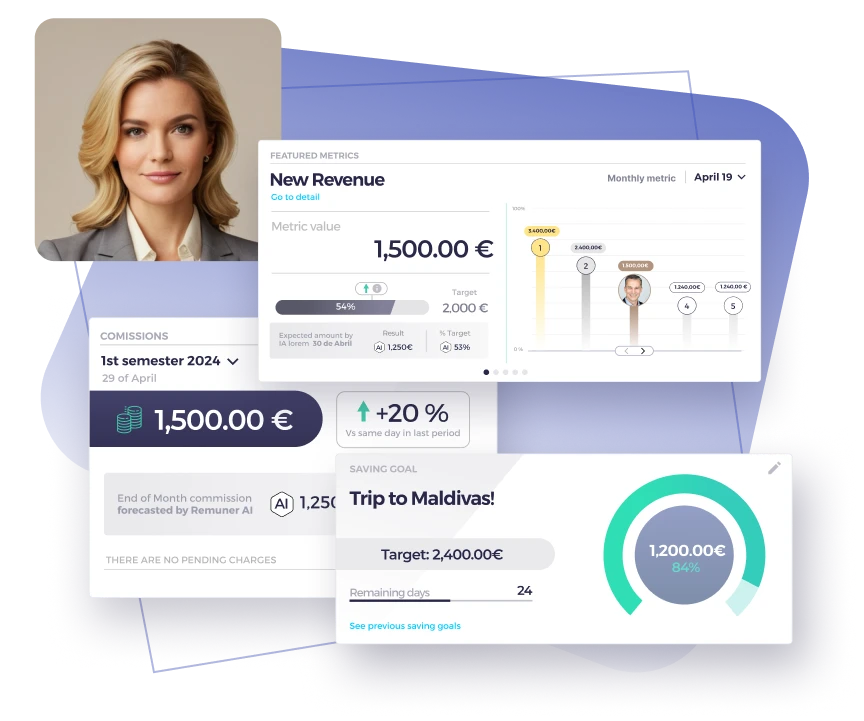Table of contents
As companies shift from one-time sales to recurring revenue models, the role of the customer success manager (CSM) has become central to sustainable growth. CSMs go beyond support—they build long-term relationships, reduce customer churn, and ensure clients see value from their product or service.
In this article, we’ll explore the customer success manager job description, required skills, compensation expectations, real-world examples, and how tools like Remuner help align incentives and performance metrics for customer-facing teams.
What is a customer success manager?
A customer success manager ensures customers achieve their goals using a company’s product. They combine elements of account management, project management, and customer experience strategy.
Unlike customer support—focused on fixing issues—a CSM proactively nurtures the customer relationship from onboarding through renewal or expansion. Their mission: increase product adoption, deepen engagement, and build long-term relationships.
Typical customer success manager job description
While every company defines the role differently, most CSMs share a core set of responsibilities
Key responsibilities:
- Guide customer onboarding and implementation
- Educate users on product features
- Monitor usage metrics and engagement health
- Lead relationship management and check-ins
- Partner with sales on upsell and cross-sell opportunities
- Advocate for customers internally
- Help reduce customer churn and increase retention
Core customer success manager skills
Successful CSMs blend soft skills with technical fluency. Here’s what great CSMs bring to the table:
- Problem solving: Navigate complex product needs or customer goals
- Empathy: Understand the customer’s pain points and desired outcomes
- Project management: Coordinate implementations or timelines
- Communication: Adapt messaging to executive and operational audiences
- Customer centric mindset: Prioritize long-term value over short-term wins
- Product knowledge: Understand how to tailor solutions across use cases
CSMs must balance being a trusted advisor with driving measurable business outcomes. Remuner helps clarify these outcomes by connecting customer success KPIs with tailored compensation models.
How CSMs compare to other customer-facing roles
| Role | Focus | KPI |
| CSM | Proactive success, adoption, growth | Retention, NRR, product usage |
| Account Manager | Contract renewals, upsells | Revenue targets |
| Customer Support Rep | Reactive issue resolution | Response time, CSAT |
| Implementation Specialist | Setup and training | Go-live speed, onboarding satisfaction |
While some overlap exists, CSMs operate across the customer lifecycle, focusing on long term outcomes over quick fixes.
How customer success managers measure success
You can’t improve what you don’t measure. Leading CSM teams use a variety of metrics to track performance and alignment.
Common KPIs:
- Net Revenue Retention (NRR)
- Customer Health Score
- Product Adoption Rate
- Customer Satisfaction (CSAT)
- Renewal and Churn Rates
- Customer Lifetime Value (CLTV)
⚙️ With Remuner, CS leaders can directly link these metrics to incentive structures—ensuring the entire customer success team is focused on outcomes that matter.
How CSMs earn: Compensation, OTE, and incentives
Average customer success manager salary:
- Base salary (U.S.): $70,000 – $110,000
- On-target earnings (OTE): $90,000 – $130,000+
- Commission/bonus structure: 10–30% of salary depending on KPIs
Unlike sales reps, CSMs often receive performance-based incentives tied to renewals, usage, or expansion—not net-new revenue. The best plans reward behaviors that drive long-term customer value.
According to Indeed, a Customer Success Manager in United States makes an average base salary of $85,754.
Real-world examples of CSM incentives
Example 1: SaaS company focused on renewals
CSMs earn a 15% bonus based on NRR per quarter, plus accelerators for hitting churn reduction targets.
Example 2: Product-led growth startup
Incentives are tied to product usage milestones. The more customers activate advanced features, the more the CSM earns.
Example 3: Enterprise software vendor
Each CSM has an upsell target in partnership with sales. Bonuses apply when expansion revenue hits specific thresholds.
Stop paying account managers like customer success managers
A common mistake in comp planning is treating account managers (AMs) and customer success managers the same—especially when structuring pay.
Although AMs and CSMs both support client relationships, their objectives are different:
- CSMs drive retention and satisfaction.
- AMs are responsible for revenue expansion—upsells, renewals, and cross-sells.
Paying AMs like CSMs (i.e., base salary with minimal incentive) results in low ownership over growth. As Remuner CEO Sergio Gonzalez puts it, “Would you pay a salesperson with no commission? Then don’t treat your AMs like support reps.”
A better approach:
Use a 60/40 compensation split, with the variable portion tied primarily to expansion revenue, and secondarily to renewals and cross-sell. For example:
- 60% base salary
- 40% variable tied to:
- Expansion revenue (highest %)
- Renewals (lower %)
- Cross-sells (through SPIFFs or accelerators)
- Expansion revenue (highest %)
Results:
✅ Higher net revenue retention
✅ Clearer alignment between AM and CSM roles
✅ Better overall customer experience and satisfaction
How Remuner supports customer success teams
Customer success teams often get left behind when it comes to modern sales incentives or comp software. With Remuner, CSM leaders can:
- Create custom comp plans for non-sales roles
- Align compensation with product usage and retention
- Offer real-time dashboards for CSMs to track progress
- Eliminate manual reporting and payout confusion
- Motivate teams through transparent goals and rewards
By enabling scalable and trackable incentive plans, Remuner helps measure success while keeping your CSMs focused on what matters most—delivering outcomes and reducing churn. Book a demo to learn more!
FAQs about Customer Success Manager
What is a customer success manager?
A customer success manager helps clients achieve value using a product or service. Their role spans onboarding, support, adoption, and long-term growth.
What does a CSM do day to day?
They conduct onboarding, monitor engagement, host check-ins, track usage data, and coordinate with sales, support, and product teams.
How is a CSM different from an account manager?
A CSM focuses on customer experience, retention, and product outcomes, while an account manager manages contracts, upsells, and revenue renewals.
How much do customer success managers earn?
The customer success manager salary in the U.S. ranges from $70K to $110K, with total compensation (OTE) often reaching $130K+ depending on performance metrics.
Can CSMs receive incentives like sales reps?
Yes. Many receive bonuses tied to retention, NRR, or product adoption. Tools like Remuner allow you to structure and automate these plans.





